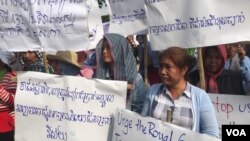Workers taking part in May Day rallies in Phnom Penh this week were largely unaware of looming threats of sanctions from the European Union and the United States, which if realized could impact on their job security.
“I don't pay attention to that issue. I know we are workers, so we just keep working. Talking about politics, I don't know,” said Srey Tearika, 44, a garment worker.
The US and EU have threatened Cambodia with deepening economic sanctions following the ruling party’s decision to dissolve the opposition Cambodia National Rescue Party ahead of the July election.
The CNRP and its leaders were accused of conspiring with foreign powers to overthrow Prime Minister Hun Sen’s government, allegations the party denies and for which little evidence has been produced to corroborate.
Tearika said garment workers could struggle if preferential treatment for Cambodian exports was impacted by the political dispute.
“Some people don’t have rice, so for those who have rice, they can go to the rice fields. For those who don’t, they will have to sell vegetables near their houses to feed their children,” she said.
The US and EU are Cambodia’s largest markets for garment exports. In February, Brussels warned that Cambodia could see its access to the Everything But Arms trade agreement blocked if it did not address the issue of political freedoms.
A group of US politicians has also drafted a bill, known as the CARI Act, that could see future investment in Cambodia more closely tied to human rights progress.
Sann Sophal, another garment worker, said that if Europe and the United States “close the doors” to Cambodian goods, “we will face many crises” as most garment workers make only between $200 and $300 per month and have families to support.
Ath Thorn, president of the Cambodian Labor Confederation, urged both sides to seek a compromise.
“Cambodia exports more than garment products to the United States, the European Union, Canada, and Japan. If they impose economic sanctions, it will mean that the victims are workers,” he said. “So we are concerned by this.
A ruling party spokesman said the government was not concerned by the threats, which the ruling party did not believe would come to pass.
“You have to understand that that's their rights to do something in the framework of their independence and sovereignty. But there would be no influence or dominance on Cambodia's independence and sovereignty,” Sok Eysan, CPP spokesman, told VOA on Sunday.







